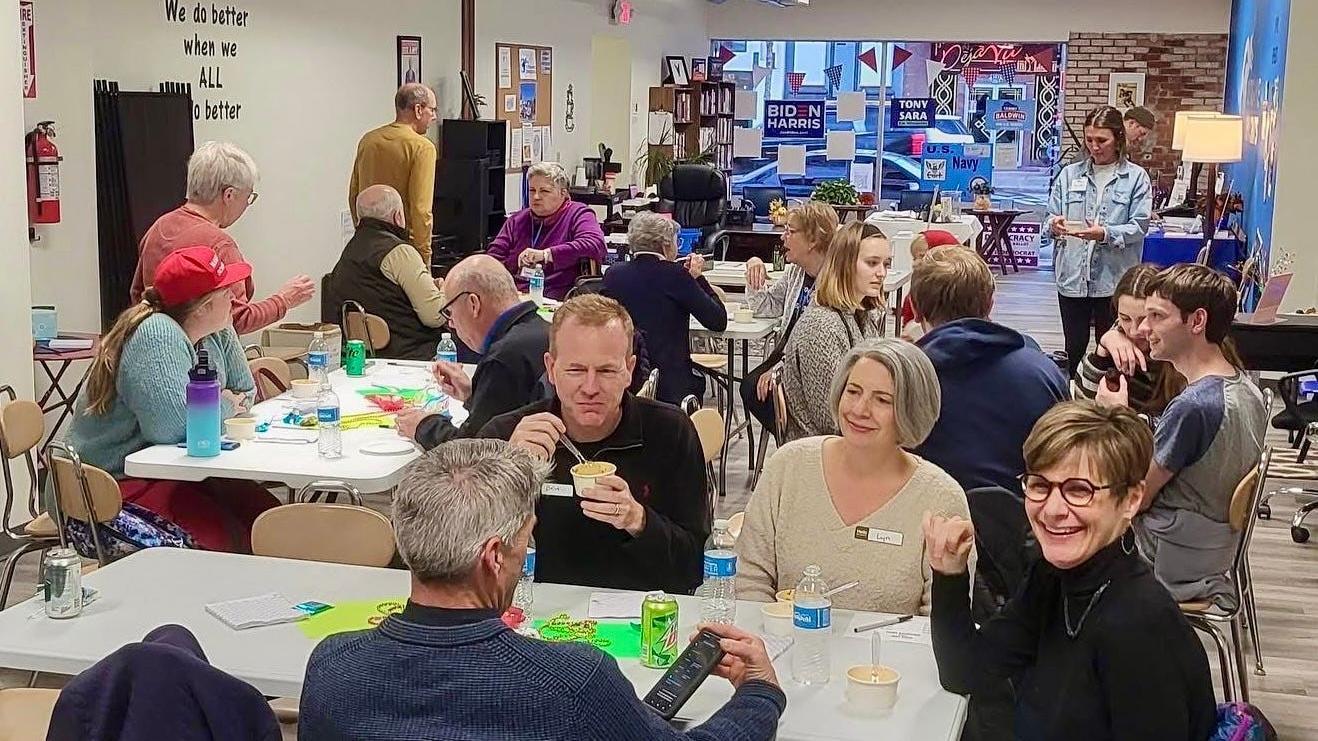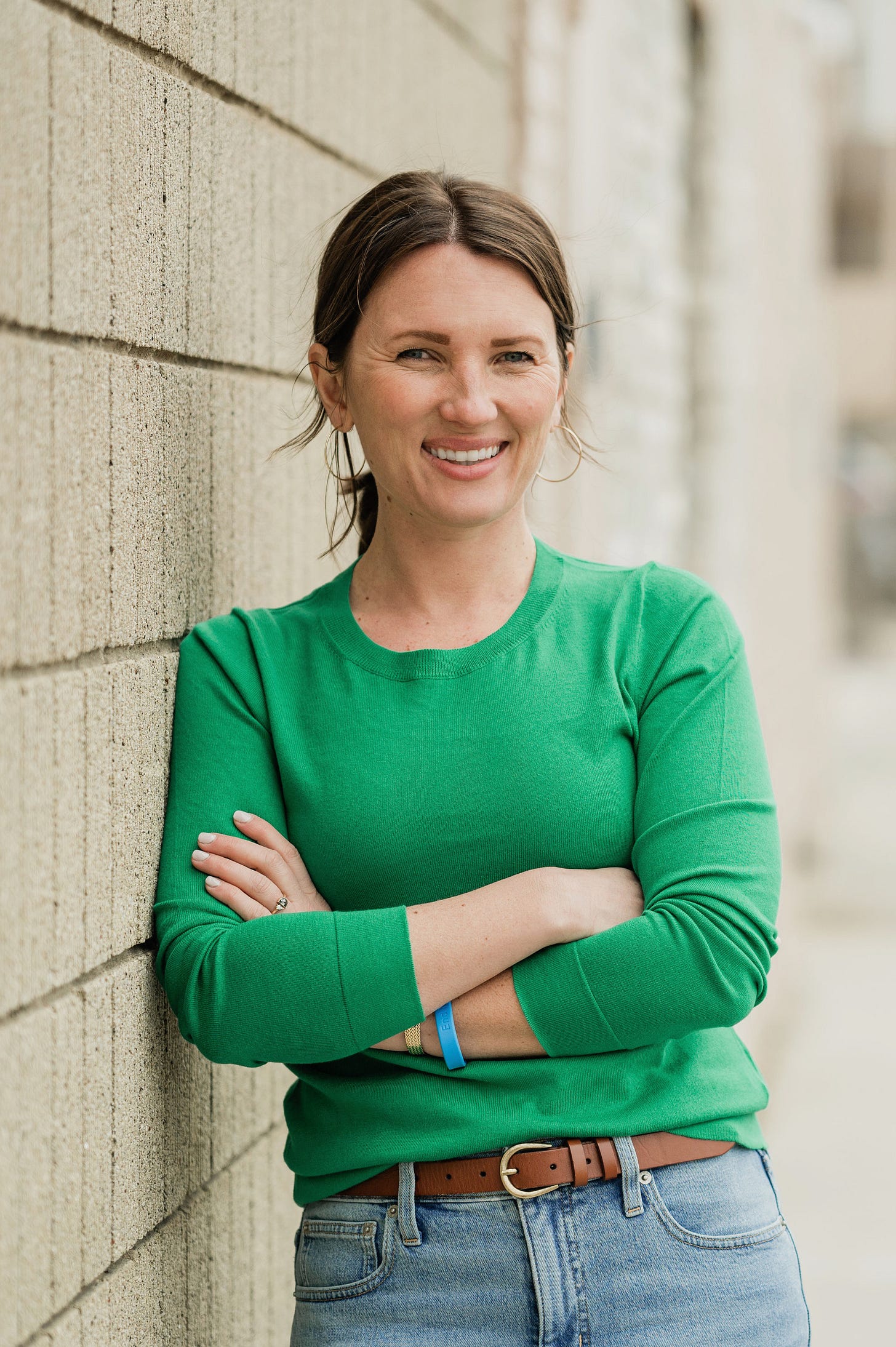
Trump’s poll numbers are finally starting to slip. The latest Pew poll shows his approval among 2024 voters is down 10 points from earlier this year — and among voters under 35, it’s down 23 points. That’s not the tidal wave some were hoping for, but it’s something. It means people are paying attention to the egregious overreach of department heads, the unhinged policy via social media, the damage this administration is leaving in its wake.
But here’s the thing: People are not looking to Democrats for answers.
The truth is this, even as Trump’s approval rating slips in some parts of the electorate, the Democratic Party isn’t exactly meeting the moment. A recent survey showed our party’s favorability at a net minus-32. That’s the worst it’s been in nearly three decades. And we need to admit that this type of fallout means it’s not just a messaging problem or a candidate issue — it’s a trust problem.
We can’t fix trust with one election cycle or a better slogan, and we certainly cannot pretend we’re going to see a “blue wave” in the midterms. Not with these numbers. So how do we begin to repair the damage done to the Democratic brand? By showing up authentically — again and again — until people believe we actually mean it.
Meeting the political moment we’re in
After college, I spent time in Nicaragua, living and teaching in communities that had survived decades of war and dictatorship. One day, as we sat eating lunch together, a friend told me something I’ve never forgotten: “When our new government came, they gave us tin roofs. Every time it rains, we remember who kept us dry.”
It wasn’t about political speeches or slogans. It was about showing up when people needed help with something real.
That story has always stuck with me, and I think about it often in my roles as a community organizer and local Democratic Party chair in Outagamie County. It serves as the inspiration for much of the work we do locally, including this past school year as I helped count out the cash and checks our local Democratic Party had collected to pay off student lunch debt in the Freedom Area School District. We raised just over $1,600 — enough to cover a fraction of their outstanding balance for the year. Every dollar came from small-town donors: folks tossing cash into a bucket at the corn roast, contributing at our membership meeting, or donating what they could online because they believed no kid should feel shame for being unable to pay for lunch.
Some of the donors weren’t Democrats. Some didn’t even have kids in the district. But the idea of a family being strapped with unpaid lunch debt when they were doing everything they could to get by moved people to act.
And when people asked why this is even an issue in the first place — why in a district like Freedom, with dedicated staff and hardworking families, kids were accruing debt — we told the truth: because the Republican-controlled legislature has chronically underfunded our community schools for over a decade. Districts are being asked to do more with less every year — and lunch debt is just one of the consequences.
This isn’t just about school lunch. It’s about a system that’s been deliberately starved. It’s about families who are doing everything they can, schools that are stretched to the brink, and a legislature that refuses to invest in the basic well-being of children.
We didn’t run a fundraiser to make a political point. We did it because no one else was stepping in. We did it because our neighbors needed it. And we made sure people knew why the gap existed in the first place.
We brought it home, and connected the hurt to policy. And just like those tin roofs in Nicaragua, people will remember.
Moments like that do something else: they open the door to a conversation. About policy, about power, and about the system feeling so rigged. We have to step up here too, saying each part aloud.
We need to do good and connect the good we’re doing to the bigger fight, championing policies that actually serve working families, and explaining those policies in plain English. The reality is most people don’t have time to research budgets or track down what happened in committee. They’re working forty-plus hours a week, raising kids, caring for aging parents. And all the while, they’re being intentionally manipulated by the other side.
Meeting people where they are — with truth and with resources — allows us to tell that truth in a way that cuts through the noise.
Read more from Emily Tseffos at The Recombobulation Area
We already have the infrastructure. Let’s use it.
Here’s what gives me hope: Wisconsin has a built-in, statewide network of volunteers ready to do exactly this. There are dozens of county party units in this state. Most are run by everyday people with jobs, families, and responsibilities — people who still make time to knock on doors, staff the fair booth, or bake bars for the fundraiser.
Too often, we treat those county parties like logistical machines: host the candidates, drop the lit, get out the vote. But they are so much more than that. As guardrails and funding fall away at the federal and state levels, these local groups must be invested in — they are the connective tissue between politics and real life.
Imagine a county party organizing rides for low-income residents to get to doctor appointments in a town 45 minutes away — especially now that rural hospitals are closing, grants for in-home healthcare have been defunded, and public transit is nonexistent. That’s not about “winning votes.” That’s about making sure someone gets to their chemo appointment. That’s about keeping someone alive.
It’s also about memory. Because you better believe the person who made it to that appointment remembers who made the call, who showed up with their keys, and who followed up later to ask how it went.
We can do that. And we are doing it — in pockets, quietly, without much fanfare. But it needs to be the rule, not the exception.
With new leadership, a chance to turn the page
With a new chair now leading the Democratic Party of Wisconsin, we have a real opportunity to rewrite the playbook. Devin Remiker is an organizer who knows that trust isn’t built from a press release in D.C. or general talking points created by strategists far away from towns like Freedom, Oconto, or Viroqua — it’s built in church basements, on bar stools, in coffee shops, on the sidelines at soccer practice, or in the car on the way to a medical appointment.
The party could do something radical: treat our local units not as cogs in a national machine, but as the frontlines of what real political work looks like.
That means funding mutual aid efforts. That means helping county parties host community meals or sponsor legal aid pop-ups. That means seed grants for lunch debt relief, food pantries, school supply drives — real community organizing that actually meets people where they are.
Because when things go wrong — and things are going wrong for a lot of people right now — folks don’t remember who had the best talking point, but they remember who helped. Who showed up. Who noticed and took action to help lessen the pain.
They remember who picked them up and drove them when they had no other way to get there. They remember who brought them the roof when it rained.
We don’t need to wait
One last thing — I really want those of us on the ground to understand is this — we don’t need to wait for permission. We don’t need the perfect polling memo, or a six-figure campaign budget, or even consensus on every issue. What we need is already here — in our communities, our relationships, our instincts to care for each other.
Every county party in this state holds the potential to do more than just mobilize voters. We can rebuild trust in politics by making it feel human again. Not something that’s flashy or performative. Just real people showing up for each other because it’s the right thing to do.
So let’s start. Let’s look around and ask: Where is the hurt? Who in our community is struggling quietly? What would it mean to show up — not with a pamphlet or a policy brief, but with a ride, a bag of groceries, a call to check in?
Because politics, at its core, is about who gets to live with dignity — and whether anyone stands with you when life gets hard.
And that’s what people remember. Not the campaign slogan or the viral moment, but the more quiet acts of solidarity. The ride to treatment. The cleared lunch bill. The knock on the door that came with no ask — just a willingness to listen.
This is how we begin to matter again.
Not someday, not after the bottom falls out or weeks before the next big race. Right now. With what we have. Exactly where we are.
Emily Tseffos is the chair of the Democratic Party of Outagamie County in northeastern Wisconsin, 2024 State Assembly candidate, and former statewide organizer for Indivisible. She is dedicated to electing progressive candidates locally and prioritizes building sustainable, genuine grassroots capacity in larger cities and rural communities through strategic, consistent development.
Subscribe to The Recombobulation newsletter here and follow us on Facebook and Instagram at @ therecombobulationarea.
Already subscribe? Get a gift subscription for a friend.
Part of a group who might want to subscribe together? Get a group subscription for 30% off!
Follow Dan Shafer on Twitter at @DanRShafer and at BlueSky at @danshafer.bsky.social.


